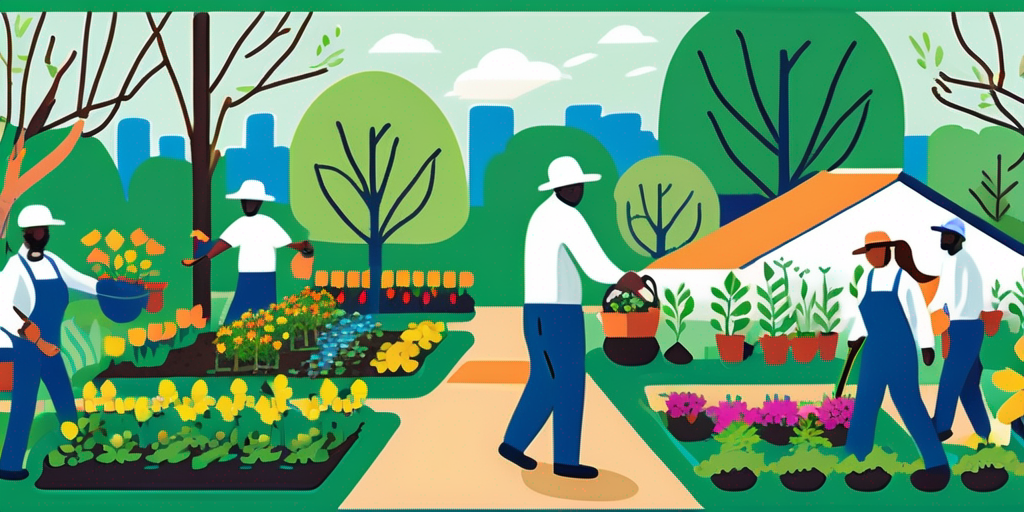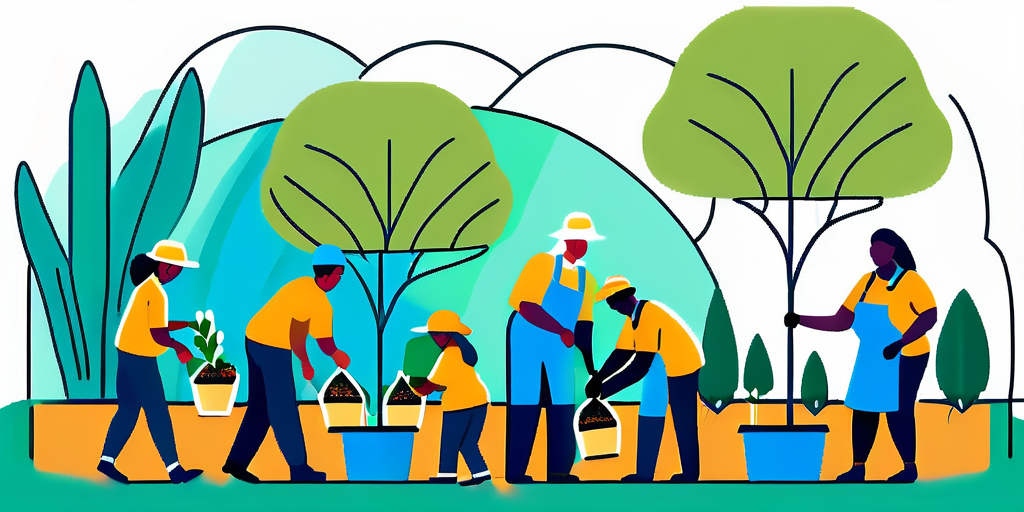
Volunteering has emerged as a vital element that enriches both communities and individuals. Through organized efforts at Tennessee National, volunteers not only contribute their time and energy but also experience profound social benefits. This article explores the multifaceted advantages of volunteering, emphasizing its impact on society, individual well-being, community building, skill development, and environmental conservation.
Volunteering involves offering one's time and skills to benefit others without financial gain. It's an altruistic endeavor that comes with a variety of rewards, such as personal growth, community connection, and social interaction. The essence of volunteering lies in the commitment to uplifting others and improving the community. Many people find that volunteering not only enhances their own lives but also contributes to a sense of purpose and fulfillment. Engaging in volunteer work can often lead to the discovery of new passions and interests, as individuals explore different avenues to make a difference.

In society, volunteering plays a critical role in addressing various social issues, from poverty to education. Volunteers become advocates for the community's needs, often taking initiative where resources are limited. By participating in volunteer activities, individuals become more aware of societal challenges, allowing them to engage in meaningful conversations and contributions. This awareness can lead to a ripple effect, inspiring others to join in and amplify the impact of volunteer efforts.
This engagement cultivates empathy and understanding, helping to bridge societal divides. As volunteers share their skills and insights, they foster a culture of support and camaraderie, which in turn can lead to positive change within their communities. Moreover, the diverse backgrounds and experiences of volunteers enrich the dialogue around social issues, creating a tapestry of perspectives that can drive innovative solutions. Through collaboration, volunteers can tackle complex problems more effectively, demonstrating the power of collective action.
The philosophy of volunteering centers on unselfishness and community responsibility. It reflects a belief that everyone has a role in shaping their environment and that collective effort can lead to significant improvements. Volunteering transcends age, background, or socioeconomic status, drawing people together with a shared purpose. This inclusivity not only strengthens community bonds but also fosters a sense of belonging among volunteers, making them feel valued and connected to something larger than themselves.
This philosophy also encourages generosity, prompting volunteers to consider how their actions can impact others. At Tennessee National, this is demonstrated through engaging in environmental, educational, and social projects that bind volunteers and beneficiaries alike. These initiatives often serve as a platform for personal development, where volunteers can learn new skills, gain leadership experience, and build lasting relationships. The shared experiences and challenges faced during volunteer work can forge deep connections, creating a network of individuals committed to making a difference in their communities and beyond.
Beyond societal contributions, volunteering offers substantial benefits for individual volunteers. The act of helping others can be incredibly fulfilling and often leads to a greater sense of purpose.
Many volunteers discover newfound self-esteem through their efforts. Achieving goals, whether small or significant, can enhance their self-worth and foster a more positive self-image. As volunteers overcome challenges and witness their impact, they become more confident in their abilities.
This confidence often carries over into other areas of life, encouraging volunteers to take on new responsibilities, make decisions, and approach challenges with a can-do attitude. Ultimately, volunteering can transform an individual's perspective, leading to a more optimistic outlook on life. Additionally, the skills developed through volunteering, such as teamwork, communication, and problem-solving, can be invaluable in both personal and professional settings. Many volunteers find that these experiences not only enrich their lives but also enhance their resumes, making them more attractive to potential employers.
Engaging in volunteer activities has proven benefits for physical and mental health. Studies suggest that volunteers experience lower rates of depression and anxiety compared to non-volunteers. The social interactions that arise from volunteering provide essential emotional support, combating feelings of isolation and loneliness.
Furthermore, physical volunteering opportunities, such as gardening or community clean-ups, encourage exercise and an active lifestyle, contributing to overall well-being. The satisfaction derived from helping others can also trigger the release of endorphins, creating a sense of happiness commonly referred to as the “helper’s high.” This phenomenon not only boosts mood but can also lead to long-term improvements in mental health. Volunteers often report feeling a sense of belonging and connection to their communities, which can be particularly beneficial in combating stress and fostering resilience. Moreover, the relationships formed through volunteering can lead to lasting friendships, further enhancing emotional well-being and creating a supportive network that individuals can rely on during challenging times.
Volunteering does not only benefit the individual. Its impact extends to broader community development, creating a robust network of relationships and trust.
One of the primary benefits of volunteering is its ability to foster social cohesion. When individuals from diverse backgrounds come together to work towards a common goal, strong bonds form. Tennessee National’s volunteer programs bring together people of various ages, races, and skills, promoting understanding and respect among participants.
These interactions can lead to lasting friendships and partnerships within the community. Such unity minimizes division and encourages collaborative efforts that can address larger community issues effectively. Moreover, the shared experiences during volunteer activities often create a sense of belonging, which is essential for mental well-being. Participants frequently report feeling more connected to their community and more invested in its future, leading to a cycle of positive engagement that benefits everyone involved.
Volunteering also opens doors to cultural exchange. At Tennessee National, volunteers have the chance to interact with individuals who represent different cultures, traditions, and perspectives. This exchange enriches the volunteering experience and broadens personal horizons.
By sharing stories and experiences, volunteers can learn from one another, fostering greater empathy and reducing misunderstanding among community members. This cultural dialogue can enhance societal harmony and create a more inclusive environment. Furthermore, such interactions often lead to innovative solutions to community challenges, as diverse perspectives can inspire creative approaches that might not have been considered otherwise. The blending of ideas and practices from various cultures can result in more effective community programs, ultimately benefiting everyone involved.
In addition to the social benefits, volunteering serves as an effective platform for personal and professional skill development. Engaging with a variety of tasks allows individuals to expand their skill sets significantly.

Volunteering exposes individuals to different roles and responsibilities, from event planning to mentoring. Participants often find themselves learning new skills that are transferable to their professional lives. Whether it’s improving communication skills, learning to work as part of a team, or managing projects, the experiences gained are invaluable.
Such experiences also enhance resumes, making volunteers more attractive candidates for future employment. Employers often view volunteering as a sign of initiative and commitment, thus offering a competitive advantage in the job market.
Moreover, the hands-on experience gained through volunteering can lead to unexpected opportunities. Many volunteers discover passions they never knew they had, which can influence their career paths. For instance, someone who volunteers at a local animal shelter may find a newfound love for animal care, prompting them to pursue a career in veterinary medicine or animal welfare. This exploration not only enriches personal lives but also encourages a sense of purpose and fulfillment.
Leadership and teamwork abilities are cultivated through volunteer work. Engaging in group projects fosters collaboration among diverse individuals, encouraging participants to work together effectively. At Tennessee National, volunteers often take on leadership roles within their groups, guiding and inspiring others.
This not only empowers the volunteers but also helps develop essential qualities such as problem-solving and adaptability. The ability to lead and collaborate seamlessly becomes an asset in many areas of life, including academic and professional environments.
Additionally, volunteering often places individuals in challenging situations that require quick thinking and resourcefulness. For example, organizing a community event may involve navigating unexpected obstacles like inclement weather or last-minute cancellations. Such experiences teach volunteers how to remain calm under pressure, think critically, and devise creative solutions, skills that are highly valued in the workplace. Furthermore, the diverse backgrounds of fellow volunteers enrich the learning experience, as they bring unique perspectives and approaches to problem-solving, further enhancing one’s adaptability and cultural competence.
At Tennessee National, volunteering extends its reach into environmental efforts, where volunteers can see a direct impact on local ecosystems and conservation initiatives.

Many volunteer opportunities at Tennessee National focus on preserving and protecting the natural environment. Volunteers participate in projects that range from tree planting to wildlife preservation. By actively engaging in these efforts, they foster connection with nature and develop a stronger appreciation for the environment.
Moreover, these conservation activities can educate participants about environmental issues, inspiring them to adopt more sustainable practices in their daily lives. As volunteers witness the positive effects of their work, they become catalysts for change, encouraging others to take action. For instance, the tree planting initiatives not only help combat climate change by absorbing carbon dioxide but also provide essential habitats for various species, thus enhancing biodiversity. This hands-on experience allows volunteers to understand the intricate balance of ecosystems and the vital role they play in maintaining it.
Volunteers at Tennessee National play a pivotal role in raising awareness about pressing environmental concerns. Through community outreach and educational activities, they share valuable information that highlights the importance of conservation.
This outreach can take many forms, including workshops, school programs, and public events. As awareness spreads, community members become better equipped to make informed decisions concerning environmental stewardship, thus amplifying the impact of volunteer efforts. Additionally, volunteers often collaborate with local schools to develop educational curricula that emphasize the significance of protecting natural resources. By engaging young minds, they instill a sense of responsibility and stewardship toward the environment from an early age, ensuring that the next generation is well-informed and motivated to continue these vital efforts.
In conclusion, volunteering at Tennessee National offers a wide array of social benefits that impact both individual participants and the greater community. From enhancing personal well-being to fostering community ties and promoting environmental conservation, the act of volunteering enriches lives in countless ways. Embracing these opportunities can lead to profound changes, encouraging individuals to become active, engaged members of society. If you're considering getting involved, the rewards you reap are sure to be as abundant as the contributions you make.